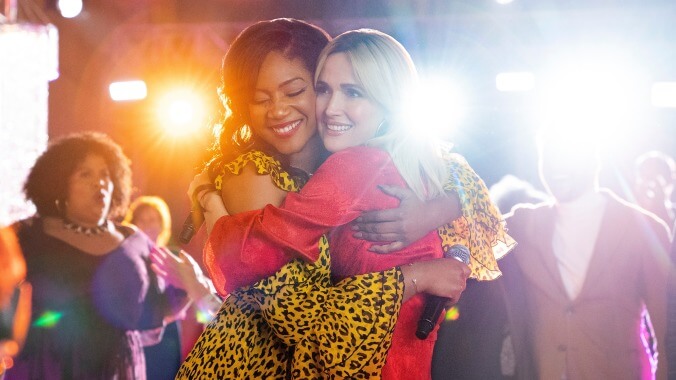Tiffany Haddish and Rose Byrne are embattled BFFs in the stiff friend-com Like A Boss

The aesthetic of Universal’s Like A Boss is all rose gold and champagne gummy bears, bold lips and sky-high platform heels. And why not? It’s a frothy 83-minute comedy about two best friends who own their own makeup business, a necessary reimagining of the rom-com heroine’s vocation now that magazine editor (for obvious reasons) and cupcake-shop owner (too many carbs) are out. To be clear, though, our protagonists Mel (Rose Byrne) and Mia (Tiffany Haddish) aren’t in love with each other—as refreshing as that would be for a studio release like this one. (They refer to each other as “non-sexual life partners,” and talk about men explicitly and often, as if to reassure the audience that their devotion isn’t gay or anything.) Instead, Like A Boss falls into the emerging genre of the friend-com, a comedy aimed at female audiences that’s structured like a rom-com, and has the cheerful tone and bright color palette of a rom-com, but focuses on the bonds of friendship rather than those of heterosexual coupling.
Per rom-com mandate, these bonds are tested when Mel pressures Mia into signing a deal with Claire Luna (Salma Hayek), a cosmetics executive who dresses in Fox News-style bandage dresses and carries around a golf club she uses to smash random objects as she monologues about fierceness and glamour. Predictably enough, Claire started her beauty empire with the help of her BFF back in the day, and is still bitter about their eventual split. That means that her offer to buy Mel and Mia’s fledgling brand (called, of course, Mel&Mia) comes with conditions designed to break up the duo, wheels that the audience can see turning long before anyone in the film is aware of them. Whether through the strength of Mel and Mia’s bond or through weak screenwriting, these gambits are underwhelming, and the film careens through a series of gross-out gags and physical comedy set pieces (most involving weed or vaginas) until finally landing on a finale that’s far-fetched, sure, but no more so than anything else in this film.
The chemistry between Haddish as the confident Mia and Byrne as the meek Mel makes up for the unlikelihood of these polar opposites spending every waking moment together, and the film does do its due diligence in explaining the origin of their sisterly bond (Mel was a foster child, and Mia’s family took her in), as well as how they can afford to live in a nice suburban house when their business is $493,000 in the hole. (Mia’s saintly mother left it to them in her will.) Their money problems are real but also not, as is the pressure from Mel’s sister (Jessica St. Clair) to find wealthy men to father their children and bring their lives stability. Little feels real in Like A Boss, from Claire’s retro-futuristic office building to the scene where Mel and Mia go up on stage to do karaoke, have an argument instead, and still exit to rousing applause. These implausibilities don’t necessarily mean anything on their own; nothing wrong with a little escapism, properly applied. But paired with the awkward performances from much of the supporting cast, they give the impression that director Miguel Arteta (Duck Butter, Beatriz At Dinner) is playing with Barbie dolls instead of directing real people.
Hayek is especially inhibited as Claire, stiff and halting where she should be larger than life. (Maybe it’s the shoes—those things are a broken ankle waiting to happen.) Jennifer Coolidge also struggles as one of Mel and Mia’s two employees, her discomfort made obvious by editing that leaves room for halting starts and stops in improv scenes. Billy Porter, on the other hand, can’t help but steal the spotlight as Mel&Mia’s other employee, and a scene where he swans his way through the dining room at a white-tablecloth lunch spot is the only unselfconsciously funny moment in the film. Of course, making it look easy is the hardest task of all for an actor, and even Byrne and Haddish, both prodigiously talented comedic performers, are only partially successful in bringing the jokes to life.
The entertaining bits are overwhelmingly physical ones: Haddish successfully applies the broad strokes of her persona to scenes like the one where she threatens to throw herself off of a balcony at Claire’s office, and Byrne turns out to be the film’s secret weapon, complementing Haddish’s bold movements with timid, halting ones. The wordplay, meanwhile, is embarrassing, not to mention uncomfortable in scenes where Hayek plays up her accent for comedic effect. A scripted subplot about two guys with a rival company called “Get Some” underplays some potentially biting commentary on male insecurity and PUA culture, instead serving mostly as an undeveloped counterpoint to Mel and Mia’s vision of a makeup brand built on sisterhood and self-love. It’s a nice idea, as is acknowledging the validity of non-romantic relationships in mainstream Hollywood filmmaking. But if you’re looking for something truly groundbreaking—or hilarious—Like A Boss isn’t it.